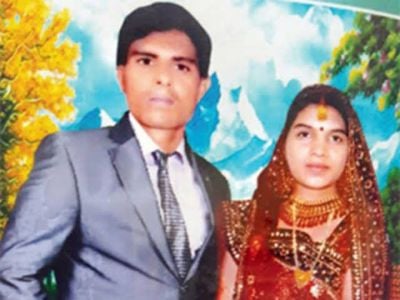Magh Krushna Dvadashi
- Society has right to know what’s happening to nuns (21 Feb 09)
- Nun’s confessions set to rock Kerala Church (19 Feb 09)
Thiruvananthapuram: The autobiography of a former nun in Kerala, in which she recounts her ‘harrowing’ experience during her time spent in the cloisters, is selling like hot cakes even as the influential Catholic church is yet to react to the charges in the book.
In her memoirs in Malayalam titled ‘Amen’ (so be it), ‘Sister’ Jesme writes of alleged sexual abuse, corruption and power struggles in the ‘dark confines’ of convents where she had lived for about 30 years.
The book has come out at a time when the influential Catholic church in Kerala is facing a difficult time following the arrest of two nuns in the infamous Sister Abhaya case.
The church is yet to officially respond to the tell-all reminiscences of the 52-year-old Jesme, holding they would react to it after studying the book.
An English professor and the Principal of a church-run college in Thrissur, Jesme quit the convent in 2008 after spending years of ‘sufferings and struggles’.
Jesme, who continues her religious life or ‘sanayas’ even after leaving the convent, said the aim of the book was not to just sell something juicy but to ‘open a little window to allow some light to enter into silent sufferings of hundreds of women.’
"I wanted an outlet for my experiences of my trauma. Society has every right to know what is happening to Sisters," Jesme said dismissing suggestions she has sensationalised issues to get cheap publicity.
"When a woman is molested only one in thousand will speak out. Then think of the nuns, they will not speak out the truth," Jesme, now staying in Kozhikode, said.
Jesme reminisces that she had had hints of things turning out against her right from the day she joined a convent as an aspirant for nunhood while continuing her college studies.
Lesbian relations are quite common in many convents where nuns often get bonded as pairs for emotional and physical relief, she alleges in her book.
Jesme says she had her first rude shock as a novice when a couple of fellow sisters told her that a priest assigned to preside over the retreat asked them to kiss him.
Startled by what she had heard, she asked the priest if it was proper to have done such a thing. She not only failed to get a convincing reply but was asked to ‘submit to the discipline expected of a nun’.
Summing up her long struggles, Jesme writes: "I renounced the position and the financial security as the principal of the church-run college to submit to God’s will and win divine freedom and peace. I am opening up my heart to my friends who understand me when confronted with harsh realities of life".
Jesme’s friend and lawyer R K Asha, who helped her in writing the book, said the work was not meant to tarnish the church’s image as alleged by certain quarters.
"She had shown courage to expose the unholy things happening in convents and whatever she had written are truths," Asha said.
"We do not want to react to it without properly studying the book. We will come out with our response in a day or two," Vicar General of Thrissur Diocese, Fr Rafael Thattil, said when the church’s views on the book were sought.
The literary and political circles too have declined to react as most writers are shying away from making any comment when contacted.
The book, published by DC books, has already had its second impression within a fortnight of its release.
Source: expressindia.com
Nun’s confessions set to rock Kerala Church
February 19, 2009
Thiruvananathapuram: Already reeling under several controversies, the Kerala Catholic Church is facing fresh embarrassment from a tell-all autobiography written by a nun who recently quit the Order alleging harassment from superiors.
‘Amen — an autobiography of a nun’, released last week, is written by Dr Sister Jesme, 52, who was the Principal of St Mary’s College, Thrissur, till last August when she quit the Congregation of Mother Carmelite (CMC).
"Dedicated to Jesus", Amen is explicit in its details of the sexual repression and harassment behind the Church walls as well as the draconian rules and "greed" of the Order. Jesme claims that since the book was released, she has been getting calls pledging solidarity.
"Nuns mingle with the whole spectrum of the community around them. They teach students, comfort the aged and nurse the sick; still the brides of the Church remain an enigma. My work would throw light on the misunderstood convent life, engulfed in darkness," says Jesme.
Apart from the Abhaya murder in which a nun and priests are accused, the Kerala Church was recently in the news for a priest "adopting" a 26-year-old woman.
Jesme’s autobiography includes a poignant version by her of how the convent authorities tried to twice prove that she had mental problems and get her admitted into a rehab centre after she reportedly spoke out against the malpractices within the Order.
Starting with her first days in the Church, 30 years ago, she talks of priets forcing novices to have relations with them and the closet homosexuality within nun ranks, "which the Church reckons as the dirtiest thing possible". "If nuns developed unusual interest in each other, authorities would deploy other inmates to watch them," she writes.
The book says Jesme herself was forced into such a relationship by a fellow nun, and that her complaints to a senior nun were ignored. According to her, the other nun said she preferred such a relationship as it ruled out pregnancy. There were others who had affairs with priests, she writes.
Another passage in Amen deals with a chance encounter Jesme had with a priest in Bangalore while on her way to Dharwar to attend a UGC refresher course in English. "My plan was to stay at the waiting room at the Bangalore railway station. But sisters in the convent gave me the address of a pious, decent priest. When I reached Bangalore, the priest was waiting to receive me. He embraced me and took me to his presbytery. After breakfast, he took me to Lalbagh (Botanical Garden) and showed me several pairs cuddling behind trees. He also gave a sermon on the necessity of physical love and described the illicit affairs certain bishops and priests had."
Later, when they were in his room, she writes, he stripped and made her do the same.
Jesme claims that while nuns in the lower ranks were punished if caught for even minor offences, the Church turned a blind eye to those superior or with influence for major transgressions.
Talking about the Church’s draconian rules, Jesme writes in the book that she was not allowed to go home when her father died, or to even pray some extra hours for his soul. "I was able to see my father barely 15 minutes before the funeral. The alibi of the superiors was that the then senior sisters were not even lucky enough to see the bodies of their parents."
During her time in the Church, Jesme often ran into problems with superiors. She was called "cine nun" after she provided office facility for a film festival at St Mary’s College, leading to the first campus film from the college, as well as when she shared dais with a sex worker for the release of a book on the life of a prostitute.
Since quitting CMC, Jesme has been staying alone in a flat in Kozhikode. She told The Indian Express she was still living as a "nun". "I go for Church mass daily and have no plans to get married."
Source: indianexpress.com

 Conspiracy to kill Hindu leaders: Shakil Sheikh arrested from Maharashtra by Surat Police
Conspiracy to kill Hindu leaders: Shakil Sheikh arrested from Maharashtra by Surat Police Shafique sentenced to life imprisonment for killing sister who converted to Hinduism, her husband
Shafique sentenced to life imprisonment for killing sister who converted to Hinduism, her husband UP: Missionary school teacher and principal booked for objecting to a pupil’s tilak
UP: Missionary school teacher and principal booked for objecting to a pupil’s tilak Ibrahimsab, Akbar awarded death penalty for setting pregnant Muslim woman on fire for marrying a Hindu boy
Ibrahimsab, Akbar awarded death penalty for setting pregnant Muslim woman on fire for marrying a Hindu boy Gujarat: Islamic preacher Sohail arrested for threatening to kill Hindu activist
Gujarat: Islamic preacher Sohail arrested for threatening to kill Hindu activist Andhra Pradesh: Farooq kills mentally challenged Hindu man for insurance money
Andhra Pradesh: Farooq kills mentally challenged Hindu man for insurance money